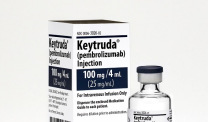FDA Prioritizes Keytruda Chemotherapy Mesothelioma Combo
Treatment & DoctorsWritten by Sean Marchese, MS, RN | Edited By Amy Edel

In a significant development for mesothelioma patients, the U.S. Food and Drug Administration has accepted priority review for a new supplemental Biologics License Application. The anticipated FDA approval could mark the beginning of a new era in the management of advanced pleural mesothelioma, offering a brighter future for those affected.
The review seeks approval for the combination of Keytruda (pembrolizumab) with chemotherapy. As a frontline treatment, the combination of Merck’s anti-PD-1 therapy with chemo could benefit patients with mesothelioma that can’t be removed with surgery (unresectable) or metastatic malignant pleural mesothelioma.
Dr. Gregory Lubiniecki, vice president of oncology clinical research at Merck Research Laboratories, emphasized the importance of this development, stating, “Malignant pleural mesothelioma is typically diagnosed in advanced stages when curative surgery is not an option and progresses quickly.”
“We continue to evaluate Keytruda in new and difficult-to-treat tumors. We look forward to working with the FDA to help bring Keytruda as a potential treatment option to certain patients with advanced malignant pleural mesothelioma,” said Lubiniecki.
KEYNOTE-483 Trial Shows Promising Results
This news comes at the very potential cusp of a landmark time for those who have this aggressive cancer that often progresses very fast and has few treatment options. The FDA’s decision is based on promising Phase 2 and 3 IND.227/KEYNOTE-483 trial results.
The KEYNOTE-483 trial has shown that Keytruda combined with chemotherapy can improve overall survival rates compared to chemotherapy alone. Results revalidate that Keytruda’s overall survival in combination with chemotherapy offers new hope for many patients and their families.
Adding Keytruda to the chemotherapy regimen reduced the risk of death 21% compared to chemotherapy alone. Patients who received combination treatment showed a far better overall response rate of 62% compared to 38% in the chemotherapy-only group.
In the phase 3 trial, researchers randomized 440 patients to 2 groups. The first received Keytruda 200 mg intravenously (IV) every 3 weeks for up to 35 cycles. They also received pemetrexed and cisplatin (or carboplatin every 3 weeks for 6 cycles). The second group only underwent chemotherapy.
The median overall survival was 17.3 months versus 16.1 months in the combination treatment group versus the chemotherapy-only group. The combination treatment arm also shows statistical significance for progression-free survival, showing a 20% benefit in the risk of progressing the disease or dying.
History of Keytruda Promises Improvements for Patients
Keytruda is a humanized monoclonal antibody that empowers the body’s immune system to detect and respond to tumor cells. It blocks the interaction between PD-1 and its bonding targets, PD-L1 and PD-L2.
This interaction activates a type of immune cell called T lymphocytes, which can target both tumor and healthy cells. This mechanism of action has made Keytruda a groundbreaking treatment in mesothelioma immunotherapy.
Since its development, Keytruda has been approved for treating multiple cancers, including melanoma, non-small-cell lung cancer and head and neck cancers. The drug is at the forefront of treatment settings for various cancers worldwide.
Expanding its role in cancer therapy can offer clinically significant benefits. The FDA’s acceptance of the Keytruda-chemotherapy combination sBLA in pleural mesothelioma may provide critical new patient options.
Potential Impact for Mesothelioma Patients
The FDA’s acceptance of the sBLA brings hope to patients with advanced malignant pleural mesothelioma. Doctors diagnosed an estimated 30,000 new cases of mesothelioma in 2022, and more than 25,000 people died from the disease.
This rare and aggressive cancer is often diagnosed at an advanced stage. Currently, treatment options are limited, and the prognosis is generally poor. Only 12% of patients survive for 5 years. The better survival and response rates bring new hope toward improved disease management and quality of life for such patients.
Mesothelioma incidence has gradually declined in the U.S. However, continued use of asbestos continues to cause exposure around the world, increasing global rates of asbestos-related illnesses.
The KEYNOTE-483 trial’s positive results indicate that combining Keytruda with chemotherapy could become a new standard of care. A new treatment offering provides more options for improved survival outcomes.
If approved, this new treatment option could help slow disease progression and improve the quality of life for many patients. The combination therapy’s ability to enhance overall and progression-free survival significantly advances the fight against mesothelioma.
The positive outcomes from the KEYNOTE-483 trial offer new hope to patients facing this challenging disease. As mesothelioma patients and the medical community await the final decision, ongoing research and innovation will continue to provide new and effective mesothelioma treatment options for patients with difficult-to-treat cancers.






